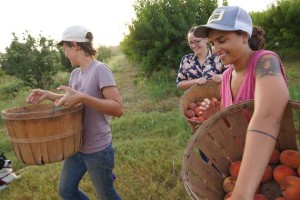>> Tensions in the General Assembly between cities and rural areas are nothing new. For generations, there have been disagreements over road building, development, and power.
Tensions in the General Assembly between cities and rural areas are nothing new. For generations, there have been disagreements over road building, development, and power.
But now the stakes are higher. As the global economy changes and population shifts more toward urban areas, these legislative spats cause serious damage. North Carolina’s population is becoming increasingly urban, shifting from just 45% urban in 1970 to 66% in 2010. Census data from 2013 shows that 15 urban counties accounted for 61% of the state’s jobs, and that employers in those same counties paid 68% of the state’s annual wages.
With legislators talking about “two North Carolina’s” and an “unfair advantage” for cities, the rhetoric has also ratcheted up. Here are five ways NC lawmakers are waging battle between urban and rural communities:
- In July 2013, the General Assembly passed a bill creating the Charlotte Airport Commission to take control of the airport from the city. The legislation prompted plenty of hard feelings and led to a protracted >>legal fight that cost more than $1 million (and ultimately left the airport in city hands).
- The elimination or reduction of economic incentives like the >>film tax credit, which helped bring more than $316 million to the state in 2014, and the >>historic tax credit, which provides incentives for the rehabilitation of historic properties, have hit North Carolina’s cities hard.
- Last session, legislators passed a bill ending the >>privilege license tax, which businesses pay for operating in a locality. The change cost municipalities more than $62 million combined, with Charlotte losing $18.1 million and Raleigh $7 million.
- Now there is a move afoot in the General Assembly to >>change the way that sales tax is distributed, favoring a formula based on population instead of the location of a sale. Statistics prepared by legislative research staffers show that Raleigh would lose about $21 million, or 23%, of its sales tax revenue by 2019. Durham would lose $16 million, or 30%.
- Just last week, legislators voted to >>redraw the districts for the Wake County Board of Commissioners, ostensibly to increase representation but likely to shift the political balance of power. Similar >>legislation would shrink Greensboro’s City Council and change its districts.
There is a line of thinking among some legislators that it is “us” versus “them” – that urban areas are getting jobs and opportunities at the expense of rural areas, and that the only way to correct this is to redirect resources from urban areas into rural areas.
With a former big city mayor in the governor’s mansion, one would think this kind of rhetoric and myopic thinking would be cut short. Unfortunately, these misguided policies seem to only be picking up speed.
That’s not good for our cities, and it’s not good for North Carolina. We ought to be about creating opportunity across the state and investing in policies that will lift everyone up instead of picking winners and losers. After all, we are all in this together.
>> Sara Lang has worked in North Carolina politics at the state, federal, and local levels for more than 15 years. A communications consultant, she lives in Cary with her husband, two young children, and a pampered dog.
Sara Lang has worked in North Carolina politics at the state, federal, and local levels for more than 15 years. A communications consultant, she lives in Cary with her husband, two young children, and a pampered dog.
There are no comments
Add yours